Poverty and Inequality Make Democracy More Fragile
Topic(s)
During a lecture at ECLAC, José Miguel Insulza stressed that tax and labor reforms in the region have been insufficient to improve the distribution of wealth.

(30 March 2010) Poverty and inequality militate against the quality of democracy and impede its full exercise in the region, said the Secretary General of the Organization of American States (OAS), José Miguel Insulza, in a lecture he delivered this morning at ECLAC headquarters in Santiago.
In his presentation, titled "Strengthening Democracy in the Inter American System", Insulza outlined what he considered the main strengths and weaknesses of democracy in Latin America and the role the OAS has played and can play in consolidating it.
Insulza was welcomed by ECLAC Executive Secretary Alicia Bárcena. In her opening words, Bárcena said that "a democratic system in which the focus of development reflects the will of the majority and allows all shareholders to take a part is also a means of equality."
"Social equality, economic dynamism and democracy do not conflict with one another, and the big challenge is to find the synergies among them. We have to grow to make equal, and make equal in order to grow. In the long-term strategic horizon, equality, economic growth and environmental sustainability have to go hand in hand," said Bárcena.
Insulza coincided in that although almost every government in Latin America today has been elected by popular vote, democracy in the region is undermined by inequality.
"That over a third of the region's population continues to live in conditions of poverty does not correspond with a continent that has our level of development. That 3% to 5% of the population gets more than 50% of national income is not congruent with democratic discourse," stated Insulza.
Although the Inter-American Democratic Charter signed by all OAS member States establishes that democracy and economic and social development "are interdependent and mutually reinforce one another," according to Insulza, political will is lacking to make development, equality and democracy interdependent, distributing the benefits of progress to everyone in equal shares.
"Neither tax systems nor labor laws have been sufficiently reformed so as to foster a better distribution of wealth... The paradox is that while political democracy continues to mature, in the economic-social sphere, society is becoming more segmented and unequal," added Insulza.
Insulza mentioned other perils faced by today's democracies in the region: the temptation to change laws and institutions for political or electoral gain, the threats to freedom of expression (legal repression, physical violence, concentration of property of the media), the weak separation among State powers, particularly between the Executive and Judicial powers, and corruption and the relationship between money and politics.
See also:
- Opening words by ECLAC Executive Secretary Alicia Bárcena (in Spanish)
- Lecture of OAS Secretary General José Miguel Insulza (in Spanish)
For more information, contact ECLAC’s Information Services.Email: dpisantiago@cepal.org; telephone: (56-2) 210-2040/2149.
Related content
Visita del Secretario General de la OEA, José Miguel Insulza a la CEPAL
Por Alicia Bárcena, Secretaria Ejecutiva de la CEPAL
Contact
Public Information Unit
- prensa@cepal.org
- (56 2) 2210 2040